
foreword | Historical Narratives | Resources | Links | Contact
EXPULSION OF THE ACADIANS
History is shaped more by human blunders than human wickedness.
In the Acadian land on the shores of the Basin of Minas,
Distant, secluded, still, the little village of Grand-Pre
Lay in the fruitful valley. Vast meadows stretched to the eastward,
Giving the village its name, and pasture to the flocks without number.
Evangeline: A Tale of Acadie
by Henry Wadsworth Longfellow
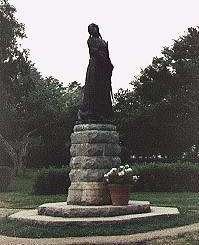 |
|
Evangeline |
The Sieur de Monts, an associate of Samuel de Champlain, had a new idea which appealled very much to the King. Life along the St.Lawrence was relatively inhospitable because of the cold weather and the unfriendly warriors. For some reason which no one then understood, a more moderate climate and therefore a more attractive site for settlement existed along the seaboard in the areas now known as Nova Scotia, Cape Breton and New Brunswick The country was called La Cadie from the Native word aquoddie meaning pollock, a fish found in abundance in the area. The summers were balmy, the soil fertile and the Natives less notorious. Why not sink French roots here in this rewarding soil? And so they did.
In 1632 after peace was established between France and England, Cardinal Richelieu, the Prime Minister of France, ordered Captain Isaac de Razilly to take possession of Port-Royal in the name of France.
 |
|
Cardinal Richelieu |
Razilly was named Lieutenant Governor of the King in New France and with the help of his brother he recruited artisans, journalists, soldiers and some families to colonize Acadia which was considered part of New France. They first settled at La Hève where they stayed for four years then moved to Port-Royal in 1636. The first permanent settlers came in 1632 and from them the Acadians of today are descended.
Acadia was the first European settlement north of Spanish Florida and in its heyday was a place of great importance. As the chosen headquarters for France's colonial efforts in Canada, the future of the region had seemed assured. With its long exposed coastline Acadia was vulnerable to seaborne raids and invasions and during its seventeenth century history was there were times when the British captured and held the young settlement.
When in 1713 Acadia was ceded to the British the Acadian population numbered 2500. The settler population remained Acadian with an uncertain relationship with the British crown and by 1755 there were some 10,000 Acadian inhabitants in the peninsula and in the Isthmus of Chignecto.
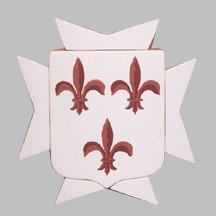 |
|
Fleur de lis |
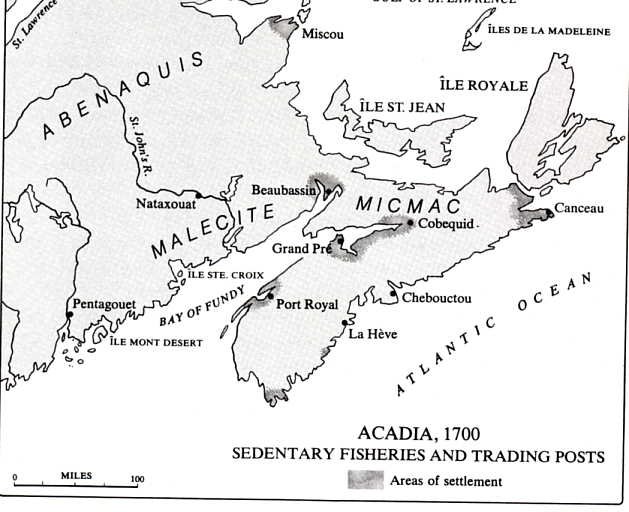 |
|
Map of Acadia |
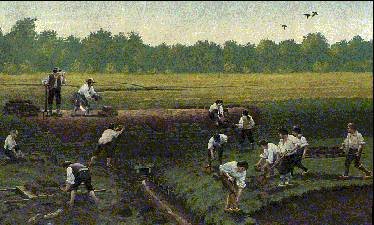 |
|
Acadian Farmers |
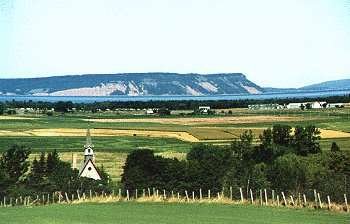 |
|
Acadian Landscape |
 |
|
Acadian Dancer |
After France formally ceded Acadia to Britain in 1713, the French moved to occupy Cape Breton Island as a substitute foothold in this strategically and economically critical area. Renaming the island Ile Royale, the French quickly built it into a colony devoted to the cod fishery and maritime trade. On the eastern shore rose the massive bastions of Louisbourg, creating one of colonial North America's few fully-fortified towns, a major military centre shaped by the growing imperial conflict between France and Great Britain.
By 1755 the cold war existing between France and Great Britain was beginning to heat up. News of French military activity in North America was received with real concern in London for it seemed to indicate that the French were violating the Treaty of Utrecht signed in 1713. By its terms France had ceded to Great Britain its claims to the Hudson Bay Company territories (Rupert's Land), Newfoundland and Acadia. France retained the island of St. Jean (now Prince Edward Island) and Cape Breton Island upon which the French erected the fortress of Louisbourg.
The sparks flared into flames and war was declared in 1756. The French had begun the Seven Years' War on this continent (1754-60) with a string of victories coupled with devastating frontier raids mounted by Natives and French Canadians. French triumphs were widespread with the only British success coming in the much-contested peninsula of Acadia on the Atlantic seaboard. In 1755 when they had captured Fort Beausejour which was renamed Fort Cumberland at the foot of the Bay of Fundy, the threat to the English in Nova Scotia appeared to be effectively removed. With their base in Halifax now well established and Fort Beausejour secured, the British were in a position to move against Cape Breton and its protecting fortress of Louisbourg.
During the tense phase of the war the military authorities declared the Acadians a security risk and decided to eliminate this potential threat to their rear of ten thousand or so French Acadian settlers in Annapolis Valley and the Minas Basin. The concern of the British was strengthened when Fort Beausejour's garrison was captured by the British and they discovered that two thirds of the soldiers in the bastion were French Acadians who had been nominally British subjects since Acadia was ceded to Britain by France in 1713. Legally these Acadian soldiers were guilty of treason for having borne arms against their king.
The surrender conditions were lenient, however, and broadly speaking the rank and file of both the Acadians and the French were very satisfied with the terms of capitulation. The Acadians were told they would be pardoned for the part they had taken in the defence of the fort on the grounds that they had been compelled against their will to take up arms. The terms certainly sounded very satisfactory and were most reassuring to the relieved Acadian troops.
A critical problem subsequently developed because the surrender document bearing this clause did not contain the signature of Governor Charles Lawrence. Lawrence rejected the article declaring he was not disposed to confirm the commitment given to the French soldiers by Brigadier Robert Monckton, one of his officers.
Here was the problem. This British province contained 10 thousand French Acadians who had consistently refused to swear allegiance to Britain's sovereign since the province became British some forty years before. At the time French forces were achieving victory after victory and in light of that Governor Lawrence believed he could not properly defend his part of the province while it contained these potential allies of the French enemy. When a shocked Lawrence learned of General Edward Braddock's disasterous defeat in the Ohio country, of British setbacks elsewhere and of heavy French reinforcements reaching Quebec and Louisbourg, he decided the Acadians must either take the oath of allegiance or go.
When Acadians were ordered to turn in all their guns they protested that they were needed for hunting. Lawrence considered their refusal "insolence" and summoned a delegation of Acadians to appear before him and his Council at the provincial capital in Halifax. Lawrence declared that he would listen to one thing and one thing only: the swearing by Acadians of the oath of allegiance. Their response was that they would do so only if it was understood they would not be forced to bear arms.
Lawrence interpreted this response to mean they were refusing to become English subjects. By refusing to take the oath they were considered "rebels" and could no longer be tolerated in the country. Lawrence reported to London that the Acadians had peremptorily refused to take the oath of allegiance to His Majesty as a result of which it was his intention to confine them until transportation could be arranged to distribute them among the several American colonies. In the meantime they were to be imprisoned on St. George's island.
The offense of the Acadians was that they sought to remain neutral in a British colony that was to be used as a base for war against their former compatriots. They also obstinately refused to take the oath of allegiance. Despite this some Acadians suspected their expulsion had more to do with their rich farmlands being much-coveted by New Englanders. The matter lay in abeyance until with news another war in the offing Governor Lawrence with the advice of his Council and that of Admirals Boscawen and Mostyn decided on ruthless action. The reason for this harsh decision was the conviction of the governor that the safety of the colony depended on the removal of the Acadians.
The plan was to be kept a strict secret "to prevent their attempting to escape." Officers were ordered "to develop some stratagem to get the men both young and old (especially the heads of families) into your power and detain them until the transports shall arrive." At Grand Pre men were to be assembled in a church and kept under guard. These hostages to fate were to await the arrival of sufficient ships to transport them away. Younger men were to be placed aboard ships already in the harbour. When the required ships failed to arrive apprehension grew over whether or not the task of holding prisoner 400 able-bodied men might overcome the force available to control them.
No Acadians knew for sure about the "reign of terror he was about to unleash." Lawrence protested that he had devoted every means to making the Acadians see the error of their ways, but nothing would induce them to acquiesce in "any measures consistent with His Majesty's honour or the security of his province." The upshot was his decision to implement "the speediest, cheapest and easiest method" of removing them from the province.
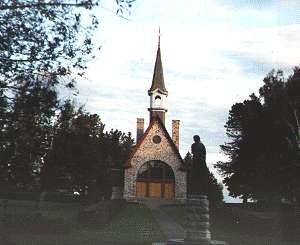 |
|
Acadian Church |
All male inhabitants of Grand Pre "ten years or older" were summoned to the parish church to be told of His Majesty's intentions.
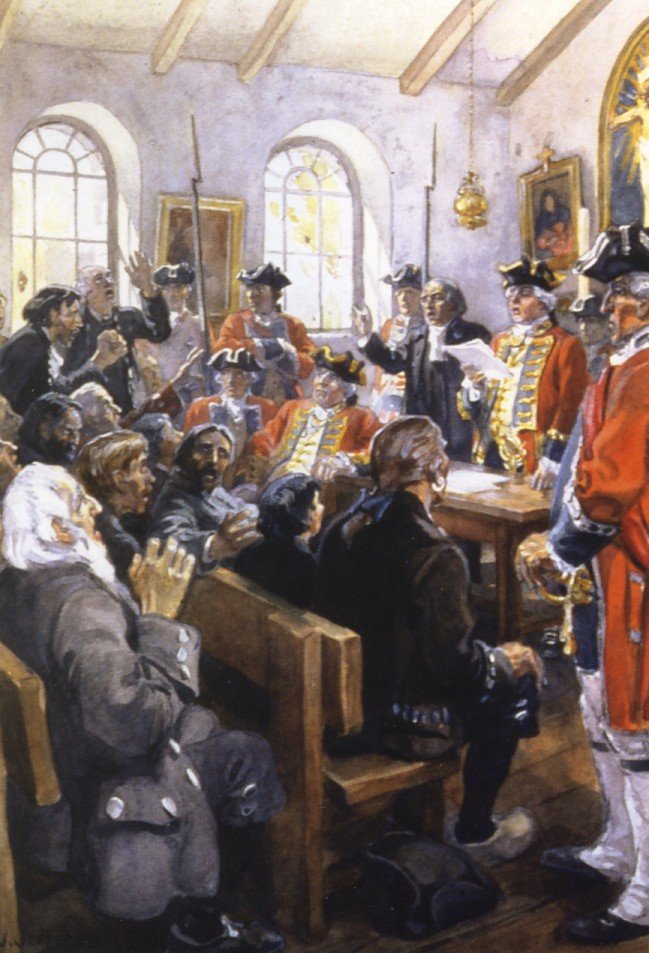 |
|
Expulsion Order Read to Acadians |
When Lawrence delivered the shocking news to the men and boys of Grand Pre, this was the first most in His Majesty's government had heard about what was afoot in Nova Scotia. Other Acadians were seized by military detachments and imprisoned. Their lands, homes and livestock were confiscated and they and their families were to be "transported out of the province." The officers in charge were instructed: "If fair means will not do you must proceed with the most vigorous measures possible, not only compelling them to embark but in depriving any who may escape of all means of shelter or support by burning their houses and destroying everything that may afford them the means of subsistence in the country." Women and children were to be taken later when additional ships arrived.
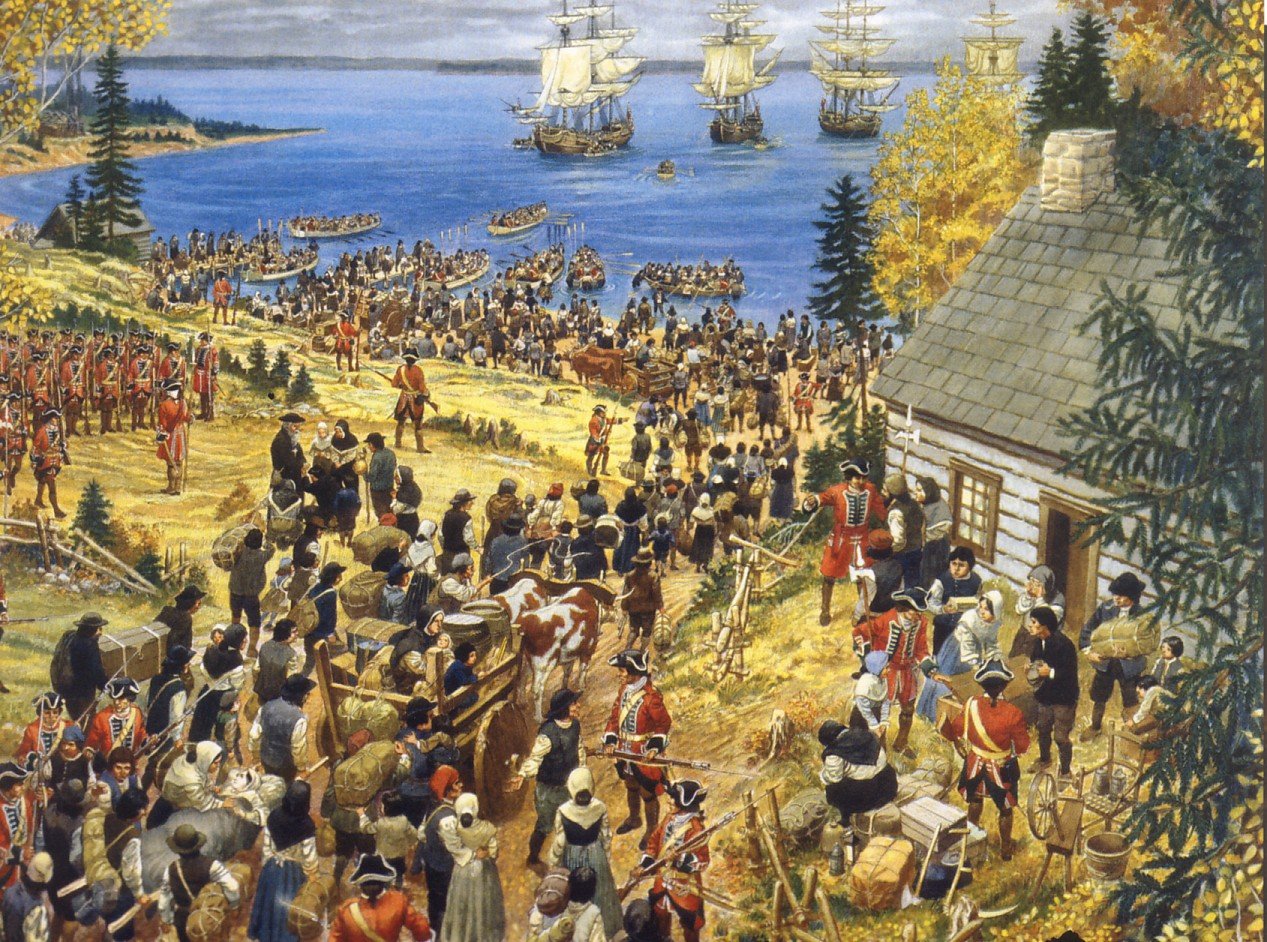 |
|
Expulsion of the Acadians |
Not wanting to strengthen New France by transporting thousands of Acadians there, it was decided to disperse them all among the English colonies. In many cases the governors of the colonies were reluctant to have this foreign and resentful influx suddenly thrust upon them and they complained bitterly to London. While the authorities in London did not respond to Lawrence's earlier indication of his drastic decision, they did express concern when they received the governors' outraged reactions to having the Acadians literally dumped in their midst.
Conditions on the ships ranged from bad to abominable. A half dozen ships dropped anchor in Boston harbour at the beginning of November 1755 "bearing a cargo of human misery." Investigators looking into the situation wrote that "the vessels in which they were transported were in general too much crowded." Travel aboard sailing vessels at any time was perilous because storms, shipwreck and disease were constant threats. In this instance misery was magnified by bad water, poor food and seasickness. Some six thousand were shipped to the English colonies where they were simply landed and left to shift for themselves. It was the official position that as far as possible families were to be kept together and hardship reduced to a minimum. Because of shipwrecks, changes in destination, general confusion and the success of some deportees in escaping, families were separated and some were never re-united.
Forty six vessels were used to transport the deportees to the American colonies. A few were repatriated to France. A number of Acadians were transported to Louisiana where today their American descendants bear the corrupted name of "Cajuns." Many others simply disappeared from sight. In all some ten thousand Acadians were deported over a period of eight years. Although a few eventually returned to their burned and ravaged homesteads most were scattered far and wide.
Some Acadians managed to escape and make their way to Quebec where they warned the Canadians of what they could expect should they be conquered. The tragedy of the Acadians burned deeply into the consciousness of the French Canadians on the St. Lawrence and it was not forgotten when later their own survival as a national community was at stake. French authorities at Quebec made the most of this and nothing could have been better calculated to make Canadians fight with ferocity born of despair.
Whatever the rights or wrongs of the draconian decision made by Nova Scotia's British Governor Lawrence during those tense and very anxious times, he inflicted by a deliberate and calculated act of military policy terrible hardships and lamentable heartbreak on the residents of Acadia. Hence the tragic tale of the expulsion of the Acadians. Thus the Acadians passed from the land of their birth and from the scenes of their youth. Some were to wander as exiles in many lands for many years, separated from their children and from their kind, while others who were more fortunate regained their native soil.
Far asunder on separate coasts, the Acadians landed...
Friendless, homeless, hopeless, they wandered from city to city.
A year later on October 19, 1760 Governor Lawrence suddenly died. He was fifty-nine. Acadians must have wondered at the words of the local press which lamented the loss of "the guide and guardian of our interests" and eulogized him as someone who had "protected the oppressed and relieved the needy." Lawrence was buried in Halifax in St. Paul's, Canada's oldest Protestant church in what was described as "a gloomy crawlspace." It is claimed by a tour guide that when Acadians visit the church, many are delighted to discover they can walk on the grave of the man who caused their ancestors so much misery.
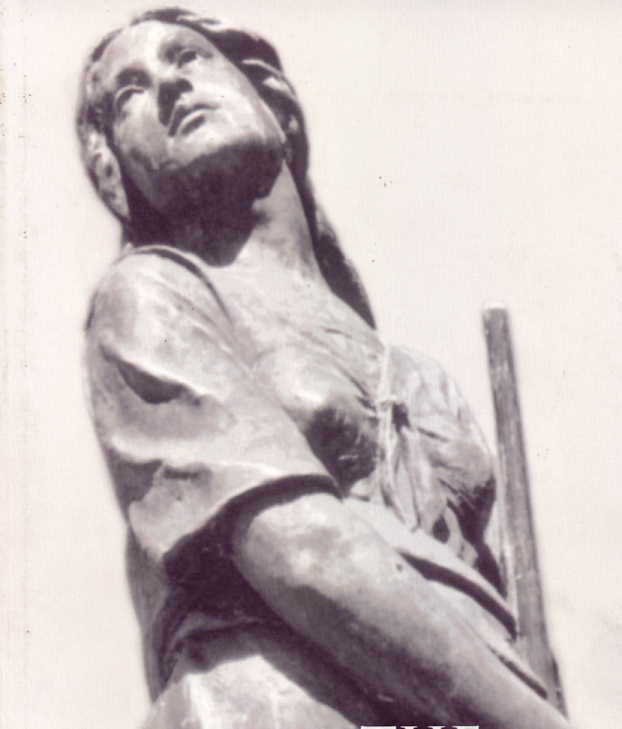 |
|
Evangeline |
Copyright © 2013 Website Administrator